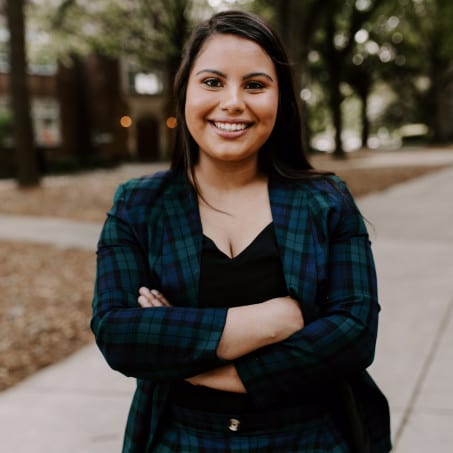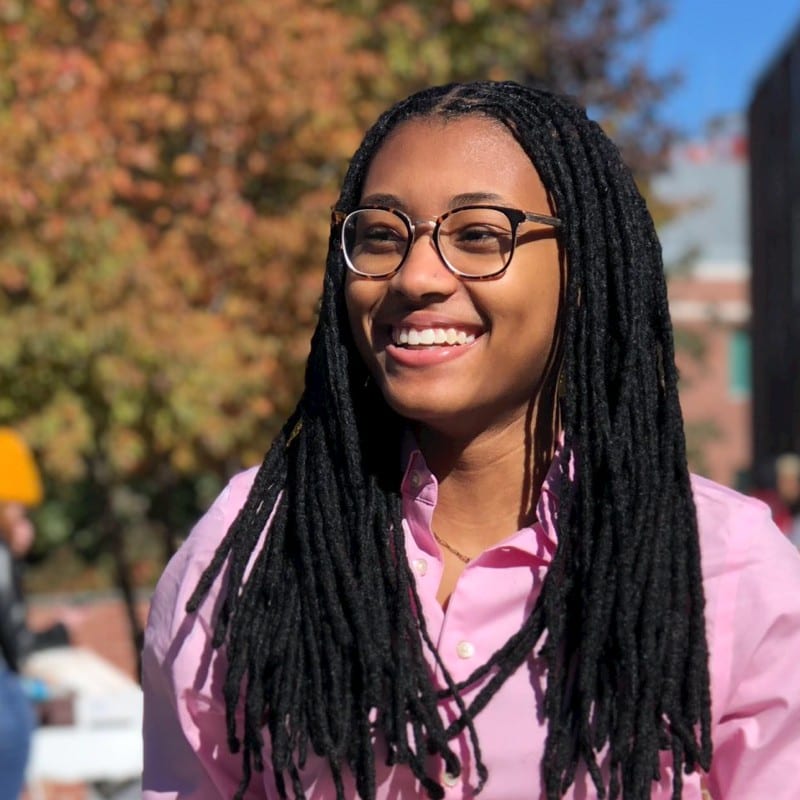
We sat down with Vanessa Alva (She/They), a Victory Congressional Internship (VCI) alumna from the 2018 cohort to learn about her journey. After VCI, Vanessa graduated from Mercer University in 2019 with a double major in Journalism and Political Science. Vanessa most notably participated in the New Georgia Project Action Fund, Progressive Turnout Project, and the Democratic Party of Georgia to assist voters and campaign for Democrats running for office in her area. The VCI alumna now plans to attend law school in the fall and focus on issues regarding healthcare laws and civil rights.
Victory Institute: What motivated you to apply to the Victory Congressional Internship?
Vanessa Alva: I applied to VCI because I was always interested in politics and my local work further inclined me to apply. A lot of people didn’t know I had a background in journalism when I interned for Congressman Jimmy Gomez and when I focused on communications work, this demonstrated to me that communication is a big portion of politics. I’m very appreciative of my journalism background because it helped me navigate my internship with comfort, and even apply to law school. I also think it was the right time for me to be on the hill. When I found out that I was going to be part of a group of LGBT+ people interning in D.C., I just knew it was going to be a suitable environment for me. I think I applied to the program out of luck because there are so many different congressional opportunities, but Victory offered something different, and I got the opportunity.
VI: Did the VCI internship influence you to get involved in other realms of politics?
VA: VCI increased my interest in local politics, especially during the Trump administration when politics were not ideal. It was difficult to achieve any progress in 2018 when Trump was in office since [marginalized communities] were on the defensive side, but it helped me realize there’s so much we can do locally. That’s why the internship inspired me to come back to Georgia, [and attempt to change the stereotypes] everybody has of the state. If everyone were to leave because of the discomfort faced in Georgia, who’s going to stay and do the work? I get that sometimes it feels unfair, sometimes it doesn’t feel safe, but we also need people to be here changing our current circumstances to create a better path for others.
VI: What do you think was one of the most essential lessons you learned when getting involved with political organizations?
VA: I understand that [national organizations] want to turn states blue, but sometimes they don’t have people from the actual state doing the work. It’s important to get involved with these organizations to make sure that the people that live in the state are being represented and can express what issues are pressing for each community.
I worked with a Georgia-based organization, that was probably my favorite experience working with the runoff, but it was very stressful. I think at one point I was working seven days a week. I focused on Gwinnett County, which is one of the largest and diverse counties in the state, and a lot of the people there were citizens, but they did not speak English. Many of them didn’t know they had to register to vote, it’s evident that there was a lot of miscommunications. That’s one of the things that the community, when it comes to voting, should dedicate funds to, even when there isn’t a presidential election. Sometimes national organizations don’t understand smaller scale issues affecting communities, and only focus on becoming blue.
VI: What are your passions regarding social issues? Does your identity as a Latinx LGBTQ+ woman enhance the way you feel and address those problems?
VA: [Latinx and the LGBT+ community] face a lot of issues that go unrecognized. A lot of people see LGBT+ issues and they just think of gay marriage. But especially when we have intersecting identities, there’s so much more that we need to pay attention to. As of right now, I’m really interested in health, because of Covid-19. I saw that the highest cases of Covid-19 in the state of Georgia were in [Gwinnet County]. This may be because these people are workers that had to go to work even at the peak of the pandemic. Moreover, some were undocumented, and they didn’t receive any aid from the government, so they really had no choice but to work, which led to them having such high rates of Covid-19 and no access to health care. So even if they do get sick, what can they do?
You also have an attack on the LGBT+ identity. We have states that are trying to ban access for health care for trans folks or are not necessarily validating our identities in the health care system. Then you have people with disabilities that are often ignored and blamed for their disability rather than giving them access to healthcare. Healthcare is just definitely something that impacts all of us, and unfortunately, it impacts people that are part of my communities the most.
VI: Do you have any advice for future VCI candidates?
VA: Take in all the connections you’re meeting and be genuine about them. Especially when you’re networking with people, people can tell when you’re not working towards building genuine connections. Also, don’t try to have the largest network. Even if you meet one person that you really connected with at a networking event, that’s OK. Those connections last longer than all the others, be intentional about the relationship and make the connection with somebody that you actually want to keep in contact with. My most useful piece of advice is to hold on to your cohort members. I think that was my favorite part of the program because we still talk, and we even had a reunion in New Orleans. These connections will serve as a support system wherever you need them.

